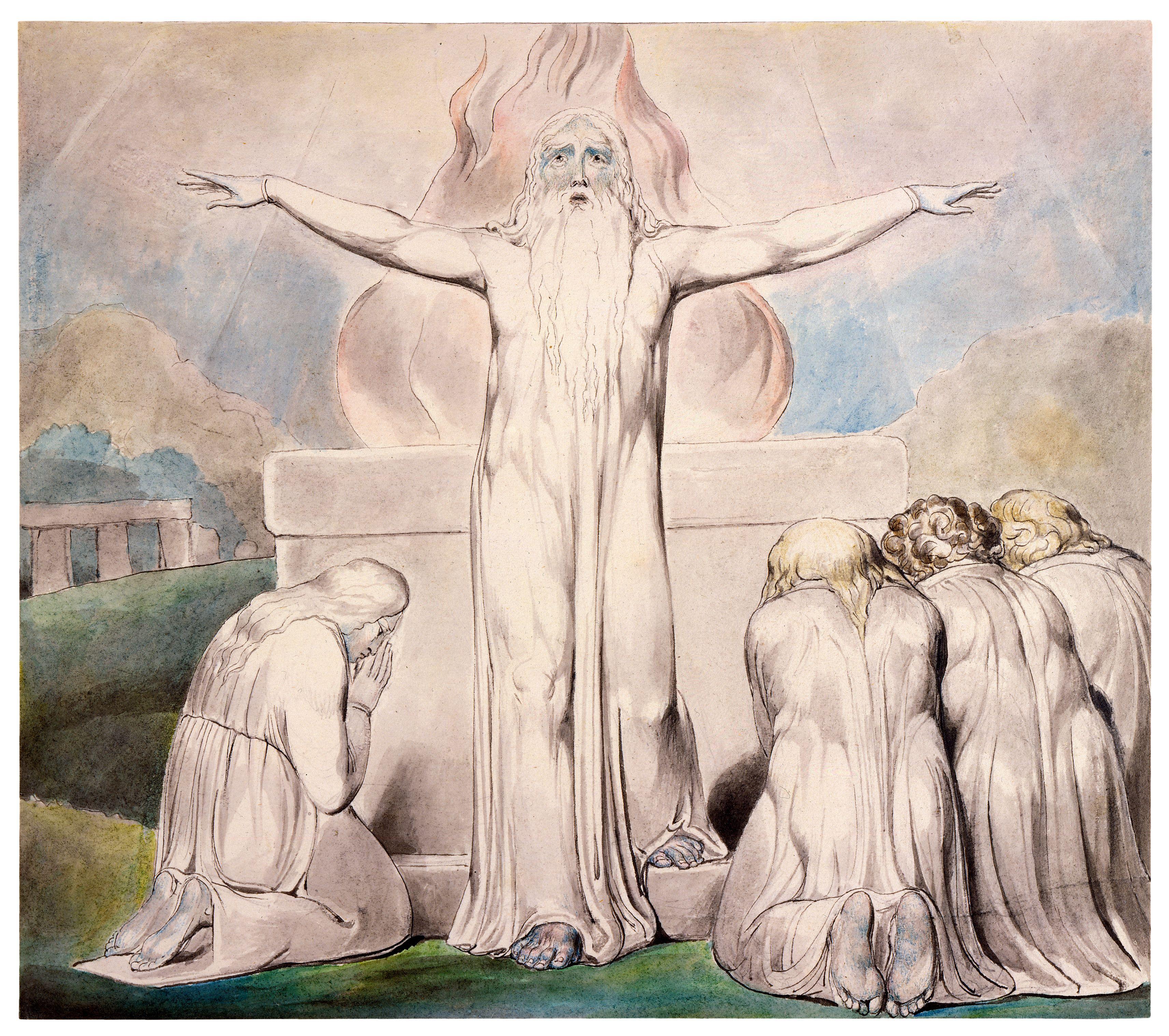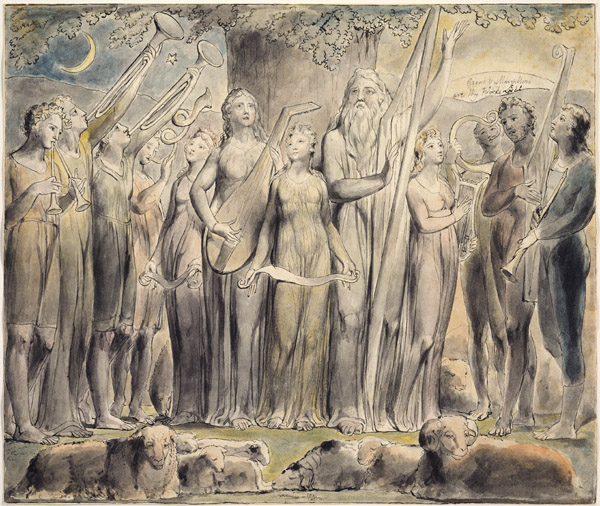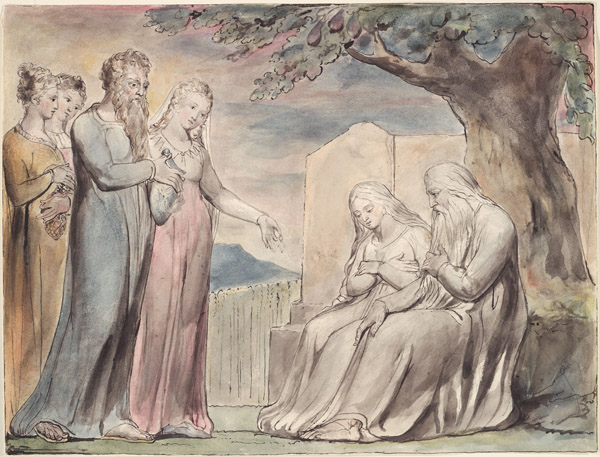 |
Wikipedia Commons
Job's Sacrifice
Butts Set of Illustrations for the Book of Job
Page 18 |
This is the Legend on the engraving which Blake
later made of this image:
. . . the Lord also accepted Job (Job 42:9)
. . . and my servant Job shall pray for you (Job 42:8)
And the Lord turned the captivity of Job, when he prayed for
his friends (Job 42: 10)
But I say unto you, Love your enemies, bless them at curse you,
do good to them that hate you, and pray for them which
despitefully use you, and persecute you (Matthew 5:44)
That ye may be the children of your Father which is in heaven:
for he maketh his sun to rise on the evil and on the good, and
sendeth rain on the just and on the unjust (Matthew 5: 45)
________________________
Job 42
[5] I have heard of thee by the hearing of the ear: but now
mine eye seeth thee.
[6] Wherefore I abhor myself, and repent in dust and ashes.
[7] And it was so, that after the LORD had spoken these
words unto Job, the LORD said to Eliphaz the Temanite, My wrath is
kindled against thee, and against thy two friends: for ye have not
spoken of me the thing that is right, as my servant Job hath.
[8] Therefore take unto you now seven bullocks and seven
rams, and go to my servant Job, and offer up for yourselves a
burnt offering; and my servant Job shall pray for you: for
him will I accept: lest I deal with you after your folly, in that
ye have not spoken of me the thing which is right, like my servant
Job.
[9] So Eliphaz the Temanite and Bildad the Shuhite and
Zophar the Naamathite went, and did according as the LORD
commanded them: the LORD also accepted Job.
[10] And the LORD turned the captivity of Job, when he
prayed for his friends: also the LORD gave Job twice as much
as he had before.
Matthew 5
[38] Ye have heard that it hath been said, An eye for an
eye, and a tooth for a tooth:
[39] But I say unto you, That ye resist not evil: but
whosoever shall smite thee on thy right cheek, turn to him the
other also.
[40] And if any man will sue thee at the law, and take away
thy coat, let him have thy cloke also.
[41] And whosoever shall compel thee to go a mile, go with
him twain.
[42] Give to him that asketh thee, and from him that would
borrow of thee turn not thou away.
[43] Ye have heard that it hath been said, Thou shalt love
thy neighbour, and hate thine enemy.
[44] But I say unto you, Love your enemies, bless them
that curse you, do good to them that hate you, and pray
for them which despitefully use you, and persecute you;
[45] That ye may be the children of your Father which
is in heaven: for he maketh his sun to rise on the evil and on
the good, and sendeth rain on the just and on the unjust.
[46] For if ye love them which love you, what reward have
ye? do not even the publicans the same?
[47] And if ye salute your brethren only, what do ye more
than others? do not even the publicans so?
[48] Be ye therefore perfect, even as your Father which is
in heaven is perfect.
When Job gained a new confidence in his ability to experience
God's presence within himself, he found that he was able to relate
differently to the outside world. When he felt accepted by a God
who loved him and whom he could love, he was ready to stand before
the altar and offer himself in service to God. One form which this
service took was becoming an intercessor for his friends. Blake
shows Job in the crucifix position to emphasize that Job is
sacrificing himself in order to become a blessing to those who
have been the enemies of his spiritual development.
This is the point on the spiritual journey at which one is
overwhelmed by gratitude. The inclusive nature of God's love
elicits the response in man of generosity. Prayer is an offering
which cements the circle of obligation among men and between
mankind and God.
There are other implications to Blake's 18th illustration of the
book of Job which may be be less obvious. The background of the
figure of Job is a stone altar on which the flames indicate that
an offering is being consumed. Both stones and fire are ambivalent
symbols: stone is associated with the Old Testament, the law and a
God of wrath; fire is associated with the New Testament, faith, and
the God of forgiveness. But the same stone of law and sacrifice
was the means God used to shape man into a consciousness receptive
to the message of love. The same fire which consumed the offerings
for sin became the symbol for the advent on the Holy Spirit
entering the minds of men and breaking down the separations among
them.
Twice Blake used the phrase 'stones of fire' found in Ezekiel.
His implication was that the spirit of man must learn to traverse
the dangers implicit in living in two worlds, of knowing himself
as susceptible to the temptations of his mortal flesh although
being in essence an immortal spirit. If Job had indeed learned
this lesson he was capable of forgiving and becoming an
intercessor for his fellow man.
J. B. Phillips Translation
Hebrews 10:1-18
The Law possessed only a dim outline of the benefits Christ would
bring and did not actually reproduce them. Consequently it was
incapable of perfecting the souls of those who offered their
regular annual sacrifices. For if it had, surely the sacrifices
would have been discontinued - on the grounds that the
worshippers, having been really cleansed, would have had no
further consciousness of sin. In practice, however, the sacrifices
amounted to an annual reminder of sins; for the blood of bulls and
goats cannot really remove the guilt of sin.
Therefore, when Christ enters the world, he says:
'Sacrifice and offering you did not desire, but a body you
have prepared for me. In burnt offerings and sacrifices for sin
you had no pleasure. Then I said, Behold, I have come - in the
volume of books it is written of me - to do your will, O God'
(Psalm 40:6-8).
After saying, "Sacrifice and offering, burnt offerings, and
offerings for sin you did not desire, nor had pleasure in them"
(which are made according to the Law), Christ then says, "Behold,
I have come to do your will, O God."
That means he is dispensing with the old order of sacrifices, and
establishing a new order of obedience to the will of God, and in
that will we have been made holy by the single unique offering of
the body of Christ.
Every human priest stands day by day performing his religious
duties and offering time after time the same sacrifices - which
can never actually remove sins. But this man (Jesus), after
offering one sacrifice for sins for ever, took his seat at God's
right hand (in heaven), from that time offering no more sacrifice,
but waiting until "his enemies be made his footstool". For by
virtue of that one offering he has perfected for all time every
one (of those Christians) whom he makes holy. The Holy Spirit
himself endorses this truth for us, when he says, first:
'This is the covenant that I will make with them after those
days, says the Lord: I will put my laws into their hearts, and in
their minds I will write them' (Jeremiah 31:33).
And then, he adds,
'Their sins and their lawless deeds I will remember no more'
(Jeremiah 31:34).
Where God grants remission of sin there can be no question of
making further atonement.
Hebrews 10 (King James Version)
Acts 2
[2] And suddenly there came a sound from heaven as of a
rushing mighty wind, and it filled all the house where they were
sitting.
[3] And there appeared unto them cloven tongues like as
of fire, and it sat upon each of them.
[4] And they were all filled with the Holy
Ghost, and began to speak with other tongues, as the
Spirit gave them utterance.
[5] And there were dwelling at Jerusalem Jews, devout men,
out of every nation under heaven.
[6] Now when this was noised abroad, the multitude came
together, and were confounded, because that every man heard them
speak in his own language.
[7] And they were all amazed and marvelled, saying one to
another, Behold, are not all these which speak Galilaeans?
[8] And how hear we every man in our own tongue, wherein we
were born?
[9] Parthians, and Medes, and Elamites, and the dwellers in
Mesopotamia, and in Judaea, and Cappadocia, in Pontus, and Asia,
[10] Phrygia, and Pamphylia, in Egypt, and in the parts of
Libya about Cyrene, and strangers of Rome, Jews and proselytes,
[11] Cretes and Arabians, we do hear them speak in our
tongues the wonderful works of God.
[12] And they were all amazed, and were in doubt,
saying one to another, What meaneth this?
GATES of PARADISE: For The Sexes, Prologue, (E 259)
"Mutual Forgiveness of each Vice
Such are the Gates of Paradise
Against the Accusers chief desire
Who walkd among the Stones of Fire
Jehovahs Finger Wrote the Law
Then Wept! then rose in Zeal & Awe
And the Dead Corpse from Sinais heat
Buried beneath his Mercy Seat
O Christians Christians! tell me Why
You rear it on your Altars high"
Jerusalem, Plate 49, (E 199)
"Learn therefore O Sisters to distinguish the Eternal Human
That walks about among the stones of fire in bliss & woe
Alternate! from those States or Worlds in which the Spirit travels:
This is the only means to Forgiveness of Enemies"
Europe, Plate 2, (E 61)
"Unwilling I look up to heaven! unwilling count the stars!
Sitting in fathomless abyss of my immortal shrine.
I sieze their burning power
And bring forth howling terrors, all devouring fiery kings.
Devouring & devoured roaming on dark and desolate mountains
In forests of eternal death, shrieking in hollow trees.
Ah mother Enitharmon!
Stamp not with solid form this vig'rous progeny of fires.
I bring forth from my teeming bosom myriads of flames.
And thou dost stamp them with a signet, then they roam abroad
And leave me void as death:
Ah! I am drown'd in shady woe, and visionary joy.
And who shall bind the infinite with an eternal band?
To compass it with swaddling bands? and who shall cherish it
With milk and honey?
I see it smile & I roll inward & my voice is past.
She ceast & rolld her shady clouds
Into the secret place."
Jerusalem, Plate 62, (E 213)
"But Los beheld the Divine Vision among the flames of the Furnaces
Therefore he lived & breathed in hope. but his tears fell incessant
Because his Children were closd from him apart: & Enitharmon
Dividing in fierce pain: also the Vision of God was closd in clouds
Of Albions Spectres, that Los in despair oft sat, & often ponderd
On Death Eternal in fierce shudders upon the mountains of Albion
Walking: & in the vales in howlings fierce, then to his Anvils
Turning, anew began his labours, tho in terrible pains!"
Jerusalem, Plate 95, (E 254)
"Her voice pierc'd Albions clay cold ear. he moved upon the Rock
The Breath Divine went forth upon the morning hills, Albion mov'd
Upon the Rock, he opend his eyelids in pain; in pain he mov'd
His stony members, he saw England. Ah! shall the Dead live again
The Breath Divine went forth over the morning hills Albion rose
In anger: the wrath of God breaking bright flaming on all sides around
His awful limbs: into the Heavens he walked clothed in flames
Loud thundring, with broad flashes of flaming lightning & pillars
Of fire, speaking the Words of Eternity in Human Forms, in direful
Revolutions of Action & Passion, thro the Four Elements on all sides
Surrounding his awful Members."
Milton, Plate 21 [23], (E 116)
"Seven mornings Los heard them, as the poor bird within the shell
Hears its impatient parent bird; and Enitharmon heard them:
But saw them not, for the blue Mundane Shell inclosd them in.
And they lamented that they had in wrath & fury & fire
Driven Milton into the Ulro; for now they knew too late
That it was Milton the Awakener: they had not heard the Bard,
Whose song calld Milton to the attempt; and Los heard these laments.
He heard them call in prayer all the Divine Family;
And he beheld the Cloud of Milton stretching over Europe.
But all the Family Divine collected as Four Suns"
Songs and Ballads, From Blake's Notebook, (E 481)
"I am in Gods presence night & day
And he never turns his face away
The accuser of sins by my side does stand
And he holds my money bag in his hand
For my worldly things God makes him pay
And hed pay for more if to him I would pray
And so you may do the worst you can do
Be assurd Mr Devil I wont pray to you
Then If for Riches I must not Pray
God knows I little of Prayers need say
So as a Church is known by its Steeple
If I pray it must be for other People"
Four Zoas, Night IX, Page 123, (E 393)
"Four Starry Universes going forward from Eternity to Eternity
And the Falln Man who was arisen upon the Rock of Ages
PAGE 124
Beheld the Vision of God & he arose up from the Rock
And Urizen arose up with him walking thro the flames
Still to the Rock in vain they strove to Enter the Consummation
Together for the Redeemd Man could not enter the Consummation"




